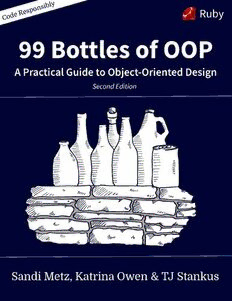Table Of Content99 Bottles of OOP
Metz, Sandi;Owen, Katrina;Stankus, TJ
Table of Contents
Colophon
Your Rights As A Reader
Dedication
Preface
What This Book Is About
Who Should Read This Book
Before You Read This Book
How To Read This Book
Code Examples
Errata
About the Authors
About the Translators
Introduction
1. Rediscovering Simplicity
1.1. Simplifying Code
1.1.1. Incomprehensibly Concise
Consistency
Duplication
Names
1.1.2. Speculatively General
1.1.3. Concretely Abstract
1.1.4. Shameless Green
1.2. Judging Code
1.2.1. Evaluating Code Based on Opinion
1.2.2. Evaluating Code Based on Facts
Source Lines of Code
Cyclomatic Complexity
Assignments, Branches and Conditions (ABC)
Metric
1.2.3. Comparing Solutions
1.3. Summary
2. Test Driving Shameless Green
2.1. Understanding Testing
2.2. Writing the First Test
2.3. Removing Duplication
2.4. Tolerating Duplication
2.5. Hewing to the Plan
2.6. Exposing Responsibilities
2.7. Choosing Names
2.8. Revealing Intentions
2.9. Writing Cost-E�ective Tests
2.10. Avoiding the Echo-Chamber
2.11. Considering Options
2.12. Summary
3. Unearthing Concepts
3.1. Listening to Change
3.2. Starting With the Open/Closed Principle
3.3. Recognizing Code Smells
3.4. Identifying the Best Point of Attack
3.5. Refactoring Systematically
3.6. Following the Flocking Rules
3.7. Converging on Abstractions
3.7.1. Focusing on Di�erence
3.7.2. Simplifying Hard Problems
3.7.3. Naming Concepts
3.7.4. Making Methodical Transformations
3.7.5. Refactoring Gradually
3.8. Summary
4. Practicing Horizontal Refactoring
4.1. Replacing Di�erence With Sameness
4.2. Equivocating About Names
4.3. Deriving Names From Responsibilities
4.4. Choosing Meaningful Defaults
4.5. Seeking Stable Landing Points
4.6. Obeying the Liskov Substitution Principle
4.7. Taking Bigger Steps
4.8. Discovering Deeper Abstractions
4.9. Depending on Abstractions
4.10. Summary
5. Separating Responsibilities
5.1. Selecting the Target Code Smell
5.1.1. Identifying Patterns in Code
5.1.2. Spotting Common Qualities
5.1.3. Enumerating Flocked Method Commonalities
5.1.4. Insisting Upon Messages
5.2. Extracting Classes
5.2.1. Modeling Abstractions
5.2.2. Naming Classes
5.2.3. Extracting BottleNumber
5.2.4. Removing Arguments
5.2.5. Trusting the Process
5.3. Appreciating Immutability
5.4. Assuming Fast Enough
5.5. Creating BottleNumbers
5.6. Recognizing Liskov Violations
5.7. Summary
6. Achieving Openness
6.1. Consolidating Data Clumps
6.2. Making Sense of Conditionals
6.3. Replacing Conditionals with Polymorphism
6.3.1. Dismembering Conditionals
6.3.2. Manufacturing Objects
6.3.3. Prevailing with Polymorphism
6.4. Transitioning Between Types
6.5. Making the Easy Change
6.6. Defending the Domain
6.7. Summary
7. Manufacturing Intelligence
7.1. Contrasting the Concrete Factory with Shameless
Green
7.2. Fathoming Factories
7.3. Opening the Factory
7.4. Supporting Arbitrary Class Names
7.5. Dispersing The Choosing Logic
7.6. Self-registering Candidates
7.7. Auto-registering Candidates
7.8. Summary
8. Developing a Programming Aesthetic
8.1. Appreciating the Mechanical Process
8.2. Clarifying Responsibilities with Pseudocode
8.3. Extracting the Verse
8.4. Coding by Wishful Thinking
8.5. Inverting Dependencies
8.5.1. Injecting Dependencies
8.5.2. Isolating Variants
8.5.3. Grappling with Inversion
8.6. Obeying the Law of Demeter
8.6.1. Understanding the Law
8.6.2. Curing Demeter Violations
8.7. Identifying What The Verse Method Wants
8.8. Pushing Object Creation to the Edge
8.9. Summary
9. Reaping the Bene�ts of Design
9.1. Choosing Which Units to Test
9.1.1. Contrasting Unit and Integration Tests
9.1.2. Foregoing Tests
9.2. Reorganizing Tests
9.2.1. Gathering BottleVerse Tests
9.2.2. Revealing Intent
9.3. Seeking Context Independence
9.3.1. Examining Bottles' Responsibilities
9.3.2. Purifying Tests With Fakes
9.3.3. Purging Redundant Tests
9.3.4. Pro�ting from Loose Coupling
9.4. Communicating With the Future
9.4.1. Enriching Code with Signals
9.4.2. Verifying Roles
9.4.3. Obliterating Obsolete Context
9.5. Summary
Afterword
Appendix A: Initial Exercise
Getting the exercise
Doing the exercise
Test Suite
References
Acknowledgements
Colophon
Version: 2.1.1
Version Date: 21-01-20
Published By: Potato Canyon Software, LLC
2nd Edition
Copyright: 2021
Cover Design and Art by Lindsey Morris.
Edited by Julia Trimmer.
Created using Asciidoctor.
Ruby Logo: Attribution-ShareAlike 2.5 Generic (CC BY-SA 2.5)
Your Rights As A Reader
Thank you for buying 99 Bottles of OOP. As the authors of a self-
published book, we very much appreciate your purchase.
This book is chock-full of lessons, and readers often write asking
if they can share them with others. We commend your desire to
pass on what you’ve learned, and ask only that while doing so
you respect our rights as authors. This means that while we
encourage you to spread the underlying ideas of the book, we
restrict your use of its actual content (the specific examples,
explanations, and descriptions).
Our bargain with you is as follows:
1. Your purchase entitles you to a single, non-transferable
license for your personal use of the ebook related files. You
may read and download the ebook you purchased to your
personal devices only.
You may not:
Sell the book
Give it away
Distribute it in any way
Print it (except for your personal use)
2. You may use 99 Bottles of OOP as curriculum in a public
education setting (university, code school, secondary school)
as long as every student buys or is provided with a legal copy
of the book.
Volume discounts are available, and there’s a free-book-for-a-
postcard program. Contact [email protected] for
information about bulk purchases.
3. You may share one small section (a chapter or less) at a free,
public meet-up as long as the material is properly attributed.
4. You may not teach a course based on the entire book, even if
this course is free and open to the public.
5. You may not use any part of 99 Bottles of OOP in any
endeavor in which you charge for your services.

